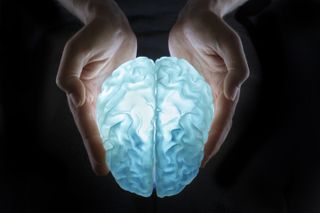Can My Brain Exist Again in Some Other Planet
Space travel can seriously change your brain

Information technology turns out that spending time in space can change your brain (and you might take to be spun around to prevent it).
Researchers take been exploring how spaceflight tin affect homo physiology and human health for every bit long every bit we have been working to launch people to space. For instance, the groundbreaking Twins Study uncovered a multitude of ways that space changes our bodies — even our gene expression!
Merely i new study suggests that spaceflight could bear on the human brain in strange and unusual ways, which could impair astronaut eyesight and last for a long fourth dimension.
Related: The Human Body in Space: 6 Weird Facts
Since the days of the shuttle program to today, astronauts have reported issues with vision afterwards traveling to space. Medical evaluations on World have revealed that astronauts' optic nerves groovy and some experience retinal hemorrhage and other structural changes to their optics.
Scientists suspect that these vision issues are caused by increased "intracranial force per unit area," or pressure in the head, during spaceflight. In a new study led by Dr. Larry Kramer, a radiologist at the Academy of Texas Health Science Center at Houston, researchers have found evidence that this pressure does, in fact, increase in microgravity.
In this study, the team performed encephalon MRI (magnetic resonance imaging, a technique that uses specialized scanners to prototype parts of the body using magnetic fields) on 11 astronauts (10 men and 1 woman) both before and after they traveled to space and for up to a year after their return. These MRI images showed that, with long-duration exposure to microgravity, the encephalon swells and cerebrospinal fluid, which surrounds the brain and spinal cord, increases in volume.
These findings back up the theory that spaceflight increases force per unit area in the head which researchers think could exist tied to issues with astronaut vision, Kramer told Space.com.
Additionally, Kramer and his colleagues found that the pituitary gland, also changes with exposure to microgravity, Kramer said. They found that the gland became compressed, information technology changed in height and shape which, as Kramer said, this is a sign of increased pressure in the head.
Related: Astronauts Apply 'Smart Shirt' and Ultrasounds to Monitor Health
The researchers also found that these effects, the swelling of the encephalon alongside the compressing pituitary gland and the pressure in the caput, was nevertheless present a twelvemonth afterward the astronauts returned from space. That duration suggests that these furnishings could be long-lasting, Kramer said. However, further report is needed to evaluate exactly how microgravity affects the encephalon over an astronaut'due south lifetime and how this might vary between people, Kramer said.
Scientists accept a number of theories virtually why the brain swells in space, but what Kramer called "1 of the most compelling," is that without gravity, the fluids in our trunk that unremarkably circulate evenly travel up toward the caput and away from the feet, he said. "The blood that usually pools in the extremities redistributes toward the head," he said. "It's not something that nosotros normally experience on Globe unless you're sort of continuing on your hands."
Researchers are also working to develop what spaceflight experts call "countermeasures," or techniques that could be used to reduce these negative effects.
To test countermeasures, research subjects are put on bed rest with their heads tilted downward to simulate the fluid shift scientists believe happens in microgravity. In this position, researchers have plant that the optic nerve swells and seen other physical effects that are also seen in spaceflight. "If nosotros can prevent those [effects] in the bed-remainder studies, then potentially nosotros can prevent those in microgravity," Kramer said.
One of the countermeasures that researchers are experimenting with is reminiscent of the revolving space station in the sci-fi pic "2001: A Space Odyssey," Kramer said. The countermeasure would "spin an astronaut effectually for a sure portion of the day, simply moving the blood through the torso and dorsum towards the legs," similar an artificial gravity, Kramer said.
Another countermeasure scientists think may aid is a specialized suit for the anxiety and legs that would help to maintain their fluid levels.
The work is described in a paper published today (April xiv) in the journal the Radiological Society of North America.
- Astronaut Scott Kelly is domicile from a 1-year mission, merely the science continues
- 'Infinite Wonder': Scott Kelly documents yearlong space mission
- Infinite Stress: How 1-year mission is studying astronaut health
Follow Chelsea Gohd on Twitter @chelsea_gohd . Follow us on Twitter @Spacedotcom and on Facebook .
Bring together our Space Forums to go on talking infinite on the latest missions, nighttime sky and more! And if you have a news tip, correction or comment, let us know at: community@space.com.
Source: https://www.space.com/brain-changes-in-space-astronaut-health-study.html
0 Response to "Can My Brain Exist Again in Some Other Planet"
Post a Comment